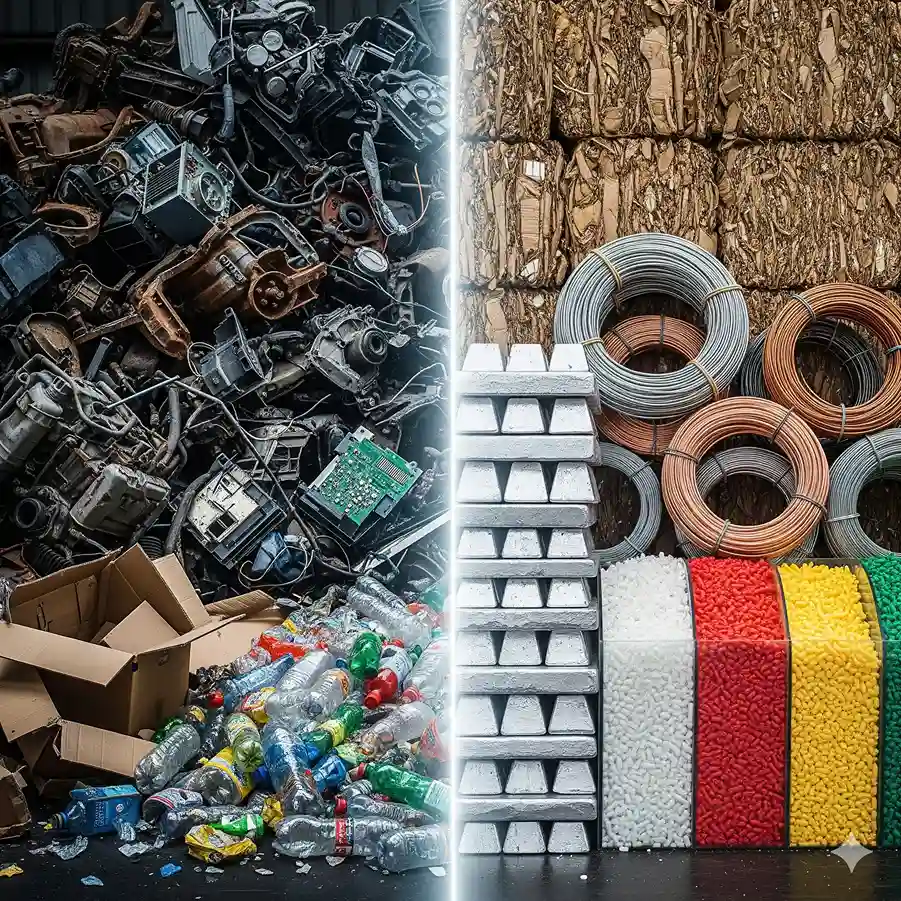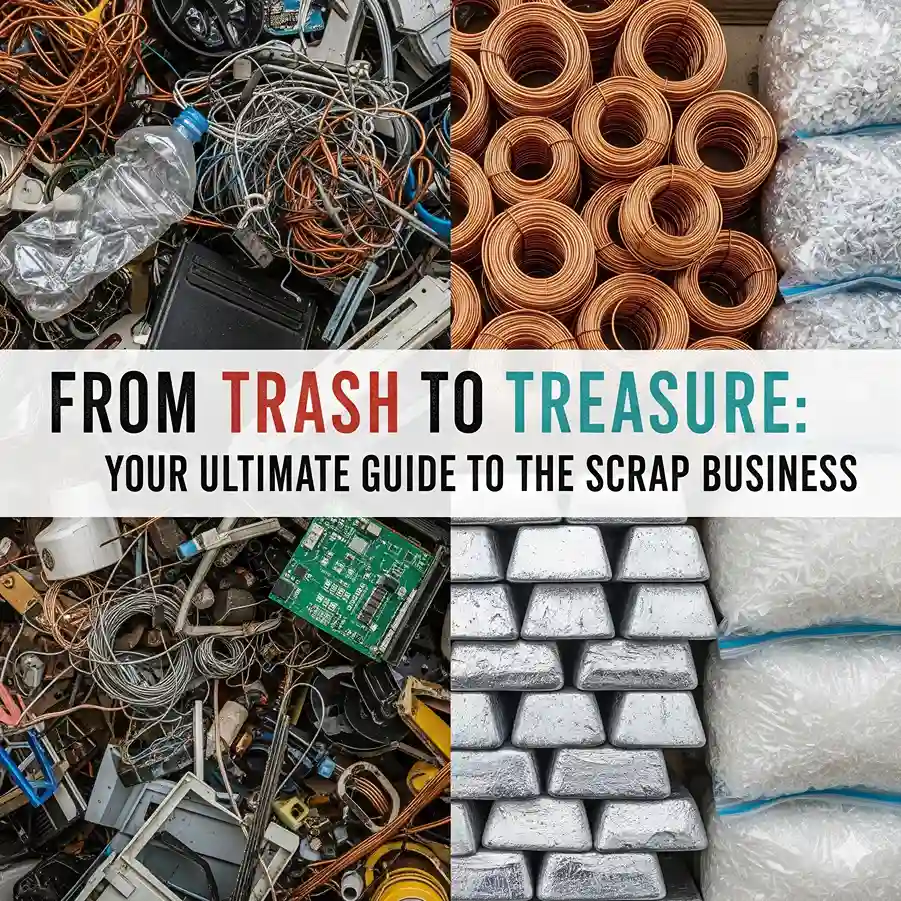For most people, the sound of metal, paper rustling, and the sight of electronics in the trash are just waste. For an entrepreneur who has a keen eye on the market, this is a goldmine. Scrap business is an important, dynamic and resilient part of India’s economy. This industry actively contributes to the sustainability of our environment by converting discarded materials into valuable resources. Modern scrap is more than just “kabadiwala”, it’s a complex network of collection and processing that helps to fuel manufacturing and conserves resources.
It’s not enough to buy low and sell high. You also need to understand a complex supply-chain, navigate a web or regulations and build a network with reliable partners. This is a business which rewards hard work, meticulous preparation, and an in-depth understanding of the market. This comprehensive guide provides you with a step by step blueprint that is packed with research and practical information to help you start and grow a scrap business.

Step 1. The Foundation: Crafting a Winning Plan
In business, a journey of a 1000 miles starts with one step. A lack of a strategy can lead to failure.
The World of Scrap
You must first decide what segment of the scrap metal market you will enter. You can focus your expertise and resources by specializing at first.
- Ferrous metals: These are the most common scrap metals. This includes metals such as iron and steel.
- Sources: Old cars, construction and demolition waste, industrial machinery (washing machines and refrigerators), manufacturing offcuts, and household appliances.
- Value: In general, lower than nonferrous metals but traded in large volumes to ensure consistent cash flow.
- Processing: Processes scrap by using balers and shears.
- Nonferrous Metals: This includes metals such as copper, aluminum and brass.
- Sources include: Electrical wire (copper), window frame and beverage cans, plumbing fixtures, brass and electronic components.
- Value: The high demand and high prices per kilogram makes this niche a profitable one. However, sourcing is more competitive.
- Processing Processes are often more detailed (e.g. removing the insulation from copper wires), to maximize value.
- Plastic Scrap In the face of plastic waste crisis, it is important to recycle plastic.
- Sources: PET bottles (milk bottles, shampoo bottles), HDPE containers, PVC pipes and packaging materials from industry.
- Value: Variates greatly depending on type and quality. Sorted and clean plastic is worth more.
- Processing: Processes polymers by sorting them according to their type and shredding, granulating, or other methods.
- Cardboard and Paper: High-volume business with low margins.
- Sources: Old newspapers, office paper and cardboard boxes from retail stores and warehouses.
- Value: Price depends on quality. (White office paper is more expensive than mixed newsprint).
- Processing: primarily involves baling into dense blocks for easy transport to paper mills.
- Electronic Waste (E-Waste): An industry that is rapidly growing and becoming complex.
- Sources: Discarded mobile phones, computers, televisions and other electronic gadgets
- Value: Includes small amounts of precious non-ferrous metals, such as gold, palladium and silver.
- Processing: Highly specialized, regulated. Dismantling is required to remove valuable components, and dispose of hazardous substances safely. The E-Waste Management Rules 2016 must be followed.
Read Our Book: Click Here
How to Develop Your Business Plan
After you’ve identified your niche, develop a business plan.
- Executive summary: An overview of the entire plan in a concise manner.
- Description of your company: Your vision, mission and legal structure. ).
- Market Research: Conduct a market analysis of the scrap metal in your area. Who are your competitors? Who are your major customers (recycling plants or foundries) What is the current price trend?
- Operational Plan: Detail your day-to-day processes. How will you collect scraps? What sorting and processing techniques will you use? What equipment do you need?
- Financial plan: The heart of your financial plan.
- Startup Costs: List every single expense: land/rent deposit, equipment purchase, license fees, initial vehicle purchase, etc.
- Operating costs: Monthly expenditures such as rent, salary, fuel, utilities and maintenance.
- Revenue Estimations: Calculate your revenue based on the projected volume of collections and market prices.
Read More: Start Steel Ingot from Scrap Business. Reduce Waste and Recycle For A Greener Future
Step 2: Navigating through the legal and regulatory maze
It is not negotiable to run a scrap yard legally. Compliance will build your credibility and protect you from heavy fines and legal troubles.
- Register your business: Firstly, register it. The simplest way to begin is as a sole proprietorship, but as your business grows you will need more protection from liability. It is necessary to obtain a PAN for your business.
- Udyam Registration (MSME): Registering on the Udyam Portal as a Micro Small or Medium Enterprise gives you access to various government schemes and benefits.
- GST registration: Registration is required if you have a turnover of more than Rs 40 lakhs per year (or Rs 20 lakhs for some states). This is necessary for issuing invoices to large, organized buyers and selling them.
- Trade license: This is a document that you must obtain from your local municipal corporation. This document certifies that the health and safety regulations of your locality are met by your business.
- Certificate of No Objection to Pollution (NOC): This certificate is crucial, especially if your company deals with metals or plastics. To prove that the storage and pre-processing activities you are performing do not harm the environment, you must submit an application to your State Pollution Control Board.
- Vehicle Scrappage License: In order to scrap end-of life vehicles, you will need to be registered as a Authorized Vehicle Scrapping Facility. This facility has strict guidelines that are part of the national Vehicle Scrappage Policy.

Step 3: Configuring your Operational Hub
It’s in your yard that the magic happens. Raw scrap is converted into a valuable product in your yard.
- Location Location Location: Your garden should be located in an industrial zone or semi-industrial area. The following are key considerations:
- Accessibility The area must be easily accessible by trucks.
- Space You will need enough space to designate areas, such as one for receiving, another for weighing and sorting, an area covered for weather-sensitive or valuable scraps, and finally a place for dispatch.
- Security: CCTV cameras and a fenced perimeter are important to prevent theft. This is especially true if you store valuable non-ferrous materials.
- How to Invest in the Right Equipment: The equipment you need will grow with your business.
- For Beginners: Basic hand tools, safety equipment (gloves and steel-toed shoes, masks) as well as a small truck (like a pick-up truck).
- For growth: When you expand, consider investing in forklifts for moving heavy material, baling presses for compacting plastic and paper, and metal-cutting tools such as shears and gas cutters.
- How to Build a Rock Solid Supply Network: The success of your business depends on the quality of its supply.
- Local collectors: Work with smaller local collectors. To build loyalty, offer them fair pricing and payment promptly.
- Industrial tie-ups: Approach manufacturing, workshops and factories. They produce high-quality, consistent scrap. Offer them a contract for scrap removal.
- Residential Societies and Offices: Connect to Resident Welfare Associations and facility managers. Organise collection drives of paper, plastic and electronic waste.
- Government auctions: Watch out for large metal scrap auctions by government departments such as railways and the Defense Department.
Read Our Project Report: Click Here
Step 4 – The Art of Selling: Turning Scrap into Cash
Selling scrap metal is not the only way to make money.
- Know your Buyers: Identify major recyclers in your area, including foundries and processing plants. Know their payment terms and quality requirements. You can also find buyers using online B2B platforms such as IndiaMART or Alibaba.
- Sorting and Grading is important: Here you can maximize your profits. The lowest price is paid for scrap that has not been sorted. Sort materials with care. Sort plastics according to their resin identification codes, such as separating copper wire from aluminium wire. Clean scrap will always be more valuable than dirty waste.
- Mastering The Market: Scrap Prices are a commodity that fluctuates daily depending on global supply, demand, industrial output and import/export policy. To understand the price trends, follow market indices such as those of the London Metal Exchange. You can use this information to decide when you should sell your stock and when you should hold it.
- Logistics & Dispatch: Make sure you have a reliable method of transporting the scrap that has been processed to the buyer. For a buyer to maintain trust, accurate weighing is essential.
Discover the Right Business for You With Our Startup Selector Tool
Conclusion
Scrap metal is the perfect example of that old saying “one man’s trash is another’s treasure.” This is a difficult field that requires grit, a business mind, and the willingness to get dirty. For those willing to work hard, the rewards are immense. You can turn a simple business idea into a profitable, sustainable and thriving enterprise by creating a plan, adhering to all legal requirements, building a network and mastering the process of trading and processing.
Scrap Business: Frequently Asked Questions
Q1. How much money do you need to start a scrap business?
You don’t need a lot to begin. Some people start small with just a truck, a scale, and some effort. You can begin for less money if you don’t buy big machines. As you learn, you can spend more and grow your business.
Q2. What are the biggest problems in a scrap business?
Prices always change. One day, your metal is worth a lot; the next, it’s not. It’s also hard to keep track of all your scrap. And finding buyers who pay on time can be tough.
Q3. Is a scrap business good for making money?
Yes, you can make good money. But you need to buy scrap for a low price and sell it for more. If you work hard and know where to buy and sell, you can earn well.
Q4. What is the future of the scrap business in India?
The future looks good. People and the government want more recycling. Factories need more recycled metal. If you stick with it, there will be more chances to grow.
Q5: What is the single most important factor for success?
It’s your network. You need good people around you. Get suppliers who always show up. Find buyers who pay you on time. If you can trust them, you’re set. Trust is like money in this business. If you have it, things get much easier. If you don’t, things get really hard. That’s just how it is.







